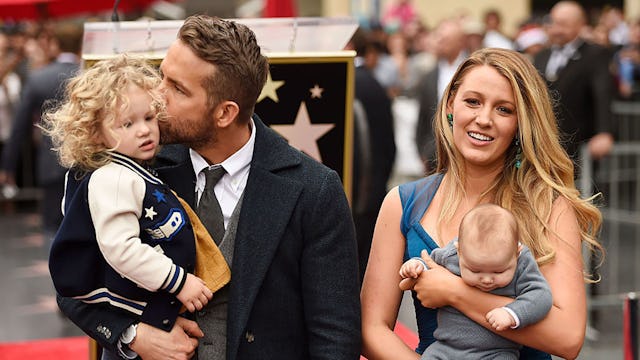There’s One Word Blake Lively And Ryan Reynolds Will Never Use To Describe Their Daughters

The actress shares her thoughts on raising girls
Blake Lively and Ryan Reynolds are just like us. OK, not really. But as far as parenting goes, we have plenty of common ground, even with the most perfectly stunning couple on earth. Just like us, Lively and her husband worry about raising their daughters in this modern world where being a girl is a little complicated.
In a recent interview with Glamour, Lively opened up about toddler daughters James and Inez. As a woman working in the male-dominated film industry, Lively knows all too well how the world treats women, and has thoughts on how she plans to raise her own girls.
She says, “Sarah Silverman does a great bit that I’m going to butcher: ‘Stop telling little girls that they can do anything. They already believe they can do anything. It opens the door for questions….’ We’re all born feeling perfect until somebody tells us we’re not. So there’s nothing I can teach my daughter [James]. She already has all of it. The only thing I can do is protect what she already feels.”
Well. Serena van der Woodsen just blew our minds a little bit. That never occurred to me and I’ve told my daughter that countless times, but her logic makes total sense.
The interviewer asks Lively how she plans to protect her daughter’s feelings and her answer is very honest. “I have no idea! I do know that I have to watch her and listen to her and not project any of my own insecurities or struggles on her.”
It ties in with her (and Silverman’s!) thoughts on “opening the door” when it comes to bringing up our insecurities in front of our daughters. If I say anything in front of my mine about my thigh fat, that could become the first time she’s aware thigh fat is something anyone worries about. The power moms have when it comes to this kind of projection is something we should be aware of.
Lively discusses how Ryan Reynolds is questioning his own language in front of their girls. “My husband was like, ‘Why do I always say he?’ And I said, ‘That’s what we’re taught.’ So he’ll pick up, like a caterpillar, and instead of saying, ‘What’s his name?’ he’ll say, ‘What’s her name?'”
And the woke feminist in Reynolds doesn’t stop there. “Or we’ve joked that my daughter is bossy,” Lively shares. “But my husband said, ‘I don’t ever want to use that word again. You’ve never heard a man called bossy.'”
Bingo.
“There would never be any negative connotation for a man being a boss,” she says,” “So to add a negative connotation on a woman being bossy? It’s belittling. And it doesn’t encourage them to be a boss.”
Do we ever hear little boys called “bossy?” Possibly, but it’s certainly not the norm. Contrast that with the number of times we’ve heard girls, even as young as infants, called “bossy.” Even as a joke, it’s not funny because when said that way, it isn’t really meant as a compliment.
“So do I know how to be the best parent for a daughter? No, I have no idea. All I can do is share what I’m thinking—and learn from others.”
That’s really all any of us can do.
This article was originally published on